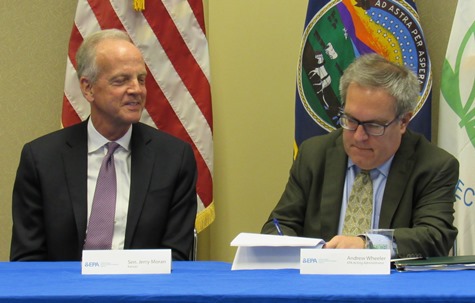
Acting Environmental Protection Agency Administrator Andrew Wheeler today in Kansas City, Kansas, signed an amendment to regulations that will help farmers.
The change to regulations requiring farmers to report air pollution from animal waste was supported in the Senate by U.S. Sen. Jerry Moran, R-Kansas.
Moran and Wheeler also met with community leaders and agriculture industry officials today at the Environmental Protection Agency’s Region 7 lab at 300 Minnesota Ave., Kansas City, Kansas.
From now on, the reporting of emissions from farms’ animal waste will not be required under the EPA’s Emergency Planning and Community Right-to-Know Act (EPCRA).
Agricultural industry representatives attending the bill signing remarked that in the past, some farms reported animal waste, and then some of those reports ended up at local fire departments, some of which responded to them as emergencies. The change will allow emergency responders to focus on serious, life-threatening spills, according to industry officials.
The current federal administration has cut the number of EPA regulations in the past few years. Administrator Wheeler was asked whether cutting regulations would help the environment, in general.
He responded that the EPA is still moving forward with new regulations. They are trying to take a look at the regulations that don’t make sense, take two to three of those regulations off, and issue a new regulation to make it work better, Wheeler said.
He said the agency has completed 28 deregulatory actions that have resulted in more than a billion dollars in savings to the American public. According to Wheeler, from 1970 to 2017, air pollution fell by 73 percent in the United States, while the economy grew by 260 percent.
He said that energy-related carbon dioxide emissions from 2005 to 2017 in the United States fell by 14 percent, compared to global emissions that increased over 20 percent. There was a 2.6 percent reduction in greenhouse gas emissions from 2016 to 2017 in the United States from major industrial sources, he said.
According to EPA officials, the EPA has completed five regulatory actions since Jan. 20, 2017, including one in fiscal year 2017, three in fiscal year 2018 and one in fiscal year 2019. There have been more than 1,400 proposed and final regulations since January 2017.
“Farmers and ranchers continue to face numerous challenges, and the removal of this unnecessary and burdensome regulation is welcome news for producers across our state,” Sen. Moran said. “It was never the intent of Congress for normal odors from animal waste on farms to fall under our nation’s emergency hazardous waste reporting requirements, so I appreciate Administrator Wheeler taking definitive action today to provide certainty to the livestock industry. The resources of our emergency responders ought to be focused on protecting the public from true environmental and chemical emergencies, not odors from animal waste.”
Sen. Moran said he was in favor of regulations that were the result of sound science, that used common sense, and that considered Congressional intent.
He is a member of the Senate Committee on Environment and Public Works.
“This proposed rule is intended to make it clear to the regulated community that animal waste emissions from farms do not need to be reported under EPCRA,” Wheeler said. “This action provides much-needed certainty and clarity to America’s farmers and ranchers. It also ensures our emergency response officials are focusing their time and resources on hazardous waste emergencies and not routine animal waste.”
“Our proposed rule would provide enhanced clarity for small and large animal producers and reduce confusion for emergency response officials throughout EPA Region 7, which covers the agricultural Midwest including Kansas, Iowa, Nebraska, and Missouri,” EPA Region 7 Administrator Jim Gulliford said.
Also at today’s meeting were Kansas Department of Agriculture Secretary Jackie McClaskey, National Association of State Emergency Response Commissions Title III Program Officials President Tim Gablehouse, and representatives from USDA, the Kansas Farm Bureau, the Kansas Livestock Association, Nebraska Cattlemen, the Livestock Marketing Association and the National Pork Producers Council.
The action taken today by the EPA will request comments on the issue of animal wastes not being subject to EPCRA reporting. The rule reflects the EPA’s interpretation that, based on the relationship between CERCLA and EPCRA reporting requirements, air emissions from animal waste at farms do not need to be reported under EPCRA.
